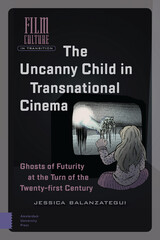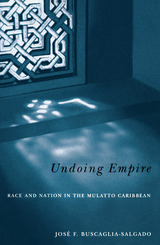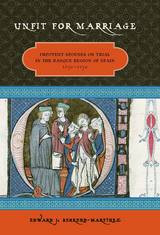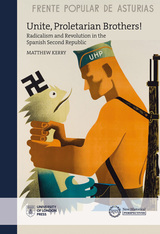382 books about Spain and 4
start with U
382 books about Spain and 4
382 books about Spain
4 start with U start with U
4 start with U start with U

The Uncanny Child in Transnational Cinema
Ghosts of Futurity at the Turn of the Twenty-first Century
Jessica Balanzategui
Amsterdam University Press, 2018
The Uncanny Child in Transnational Cinema illustrates how global horror film depictions of children re-conceptualised childhood at the turn of the twenty-first century. By analysing an influential body of transnational horror films, largely stemming from Spain, Japan, and the US, Jessica Balanzategui shows how millennial uncanny child characters resist embodying growth and futurity, unravelling concepts to which the child's symbolic function is typically bound. The book proposes that complex cultural and industrial shifts at the turn of the millennium resulted in these potent cinematic renegotiations of the concept of childhood. By demonstrating both the culturally specific and globally resonant properties of these frightening visions of children who refuse to grow up, the book outlines the conceptual and aesthetic mechanisms by which long entrenched ideologies of futurity, national progress, and teleological history started to waver at the turn of the twenty-first century.
[more]

Undoing Empire
Race And Nation In The Mulatto Caribbean
Jose F. Buscaglia-Salgado
University of Minnesota Press, 2003
A revelatory account that places mulatto experience at the center of Caribbean history.
This ambitious book brings to light the story of what José F. Buscaglia-Salgado terms mulataje-the ways Caribbean aesthetics offer the possibility of the ultimate erasure of racial difference. Undoing Empire gives a broad panorama stretching from the complex politics of medieval Iberian societies to the beginning of direct U.S. hegemony in the Caribbean at the end of the nineteenth century.
Buscaglia-Salgado begins with an examination of Washington Irving's "American Columbiad" as an act of historical and territorial plundering. He then traces the roots of mulatto society to the pre-1492 Iberian world, not only finding a connection between the Moors of "Old Spain" and the morenos-the blacks and mulattos of the New World-but also offering a profound critique of creole and imperial discourses. Buscaglia-Salgado reads the pursuit and contestation of what he terms the European Ideal in colonial texts, architecture, and paintings; then identifies the mulatto movement of "undoing" the Ideal in the wars that shook the nineteenth-century Caribbean from Haiti to Cuba, arguing that certain projects of national liberation have moved contrary to the historical claims to freedom in the mulatto world.
José F. Buscaglia-Salgado is assistant professor of modern languages and comparative literature and director of Cuban and Caribbean Programs at the University at Buffalo.
[more]

Unfit For Marriage
Impotent Spouses On Trial In The Basque Region Of Spain, 1650-1750
Edward J. Behrend-Martinez
University of Nevada Press, 2014
The Catholic Church of early modern Europe intended the sacrament of matrimony to represent a lifelong commitment, and it allowed few grounds for the dissolution of an unhappy marriage. One was nonconsummation owing to the sexual impotency of one of the partners. Even then, an annulment was granted only after a church court had conducted a lengthy investigation of the case, soliciting testimony from numerous witnesses as well as from the aggrieved couple, and had subjected the allegedly impotent spouse (and sometimes both spouses) to an intimate physical examination.
Edward J. Behrend-Martinez has studied the transcripts of eighty-three impotency trials conducted by the ecclesiastical court of Calahorra (La Rioja), a Spanish diocese with urban and rural parishes, both Basque and Castilian. From these records, he draws a detailed, fascinating portrait of private life and public sexuality in early modern Europe. These trials were far more than a salacious inquiry into the intimate details of other people’s lives. The church valued marital sex as a cornerstone of stable society, intended not only for procreation but also for maintaining domestic harmony. Every couple’s sex life, however private in practice or intention, was a matter of public and ecclesiastical concern.
Unfit for Marriage offers vivid accounts of marital sex and the role that property, gender, and personal preference played in marriage in early modern Europe. It is essential reading for anyone interested in social history, sexuality, gender studies, canon law, legal history, and the history of divorce in western Europe.
Edward J. Behrend-Martinez has studied the transcripts of eighty-three impotency trials conducted by the ecclesiastical court of Calahorra (La Rioja), a Spanish diocese with urban and rural parishes, both Basque and Castilian. From these records, he draws a detailed, fascinating portrait of private life and public sexuality in early modern Europe. These trials were far more than a salacious inquiry into the intimate details of other people’s lives. The church valued marital sex as a cornerstone of stable society, intended not only for procreation but also for maintaining domestic harmony. Every couple’s sex life, however private in practice or intention, was a matter of public and ecclesiastical concern.
Unfit for Marriage offers vivid accounts of marital sex and the role that property, gender, and personal preference played in marriage in early modern Europe. It is essential reading for anyone interested in social history, sexuality, gender studies, canon law, legal history, and the history of divorce in western Europe.
[more]

Unite, Proletarian Brothers!
Radicalism and Revolution in the Spanish Second Republic
Matthew Kerry
University of London Press, 2020
In October 1934, the northern Spanish region of Asturias was the scene of one of the most important outbursts of revolution in Europe. Thousands of left-wing militants took up arms and fought the Spanish army in the streets of Oviedo, while in the rear-guard committees proclaimed a revolutionary dawn. After two weeks, however, the insurrection was crushed, and the ensuing widespread repression was central to the polarization and fragmentation of Spanish politics prior to the Civil War (1936–39). Weaving together a range of everyday disputes and arenas of conflict, from tenant activism to strikes, boycotts to political violence, Unite, Proletarian Brothers! reveals how local cleavages and conflicts operating within the context of the Spanish Second Republic (1931–36) and interwar Europe explain the origins, development and consequences of the Asturian October. The book sheds new light on the long-debated process of “radicalization” during the Second Republic, as well as the wider questions of protest, revolutionary politics, and social and political conflict in inter-war Europe.
[more]
READERS
Browse our collection.
PUBLISHERS
See BiblioVault's publisher services.
STUDENT SERVICES
Files for college accessibility offices.
UChicago Accessibility Resources
home | accessibility | search | about | contact us
BiblioVault ® 2001 - 2024
The University of Chicago Press









